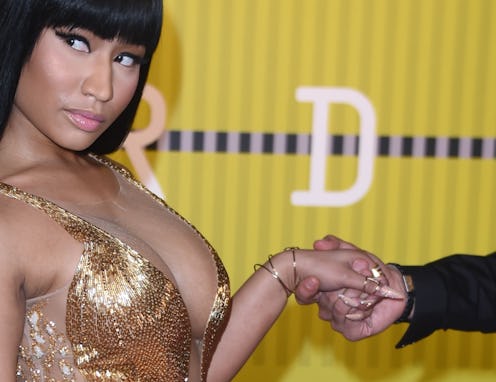Entertainment
Nicki Minaj Proves Yet Again She's A Role Model
Nicki Minaj is everything I could ever hope to be: she's powerful, self-assured, talented, hyper-aware, and never fears speaking her mind in a music industry that still does not fairly represent black artists. For example: in her cover story for New York Times Magazine, the 32-year old rapper was questioned about the beef between her boyfriend Meek Mill and Drake, her BFF and coworker. When she said that she hated it and was subsequently asked if there was a part of her that "thrived on drama," Minaj walked out of the New York Times Magazine interview in offense. "Do not speak to me like I'm stupid or beneath you in any way," she said, according to the piece, before decisively ending the conversation.
Minaj raps on just about everything in the cover story — from becoming comfortable with her body, to why she decided to rightfully and powerfully call out Miley Cyrus at the MTV Video Music Awards, addressing that the heart of the issue was racism and appropriation: "You’re in videos with black men, and you’re bringing out black women on your stages, but you don’t want to know how black women feel about something that’s so important?" She said in the interview.
But, the most powerful moment came when Minaj reacted to the interview's use of the word "drama" when she questioned Nicki about the ghostwriting feud between Drake and Meek Mill:
'That’s disrespectful,’ Minaj said, drawing herself up in the chair. ‘Why would a grown-a** woman thrive off drama?’
‘That’s the typical thing that women do. What did you putting me down right there do for you?’ she asked. ‘Women blame women for things that have nothing to do with them. I really want to know why — as a matter of fact, I don’t. Can we move on, do you have anything else to ask?’ she continued. ‘To put down a woman for something that men do, as if they’re children and I’m responsible, has nothing to do with you asking stupid questions, because you know that’s not just a stupid question. That’s a premeditated thing you just did.’
There aren't even enough words to explain inspirational it is to see Minaj take the reigns of that situation by not continuing to engage in a conversation that was clearly offensive to her. Minaj is often accused of being a "drama queen" for "feuding" with other female artists — notably of course Miley Cyrus and Taylor Swift — when, in reality, the coded language reducing those conversations to feuds detracts from the fact that she's having real conversations about racism and appropriation in the music industry and beyond.
After all: who can forget the powerful message Minaj sent on Instagram when her Anaconda album cover was called "inappropriate and racy," and she responded in kind by posting similar images of white women in just as little clothing that were never deemed unacceptable by the media? And, in perhaps my personal favorite Minaj moment, there's the interview for her MTV documentary in 2010 where Minaj keenly pointed out the double-standard that powerful women constantly face, saying: "When I'm assertive, I'm a bitch. When a man is assertive, he's the boss."
Thus, Minaj was well within her rights to end the interview, and take back control of the conversation. In the piece, the interviewer admits that she was in the wrong, and, while credit is due to her for including her own micro-aggressions in the final story, it's unacceptable that such a powerful businesswoman like Minaj is still subject to such uncomfortable confrontations. Minaj makes me feel like, no matter what, it's important to stand up for your self-worth, and always question institutions and authority. In the words of Nicki Minaj herself, "What's good?"
The answer is, as always, Nicki Minaj herself.
